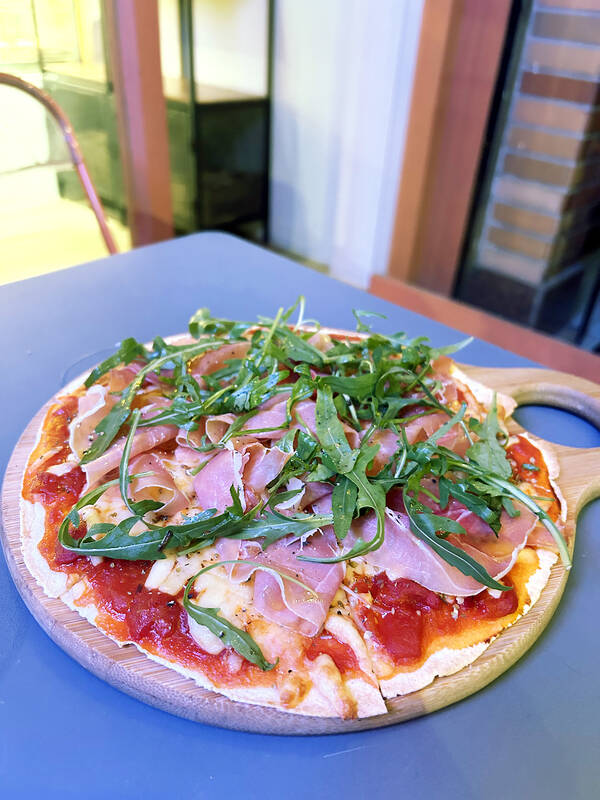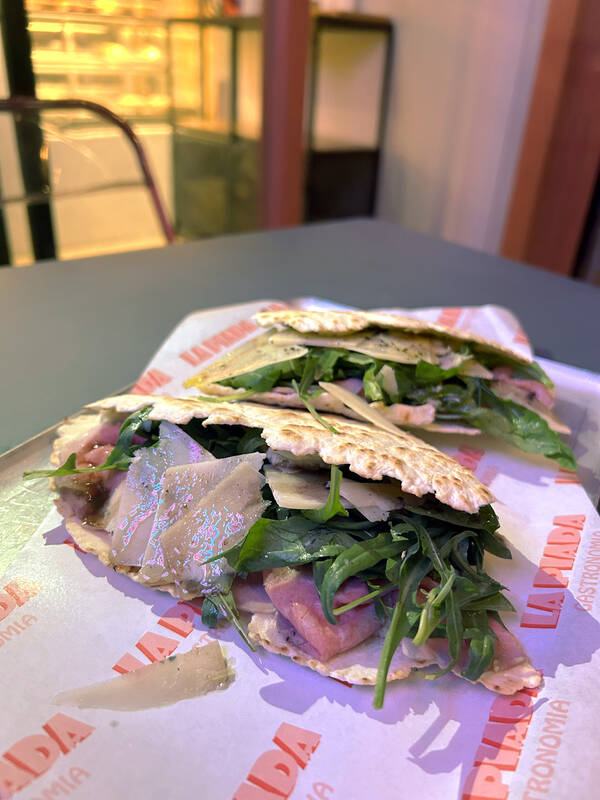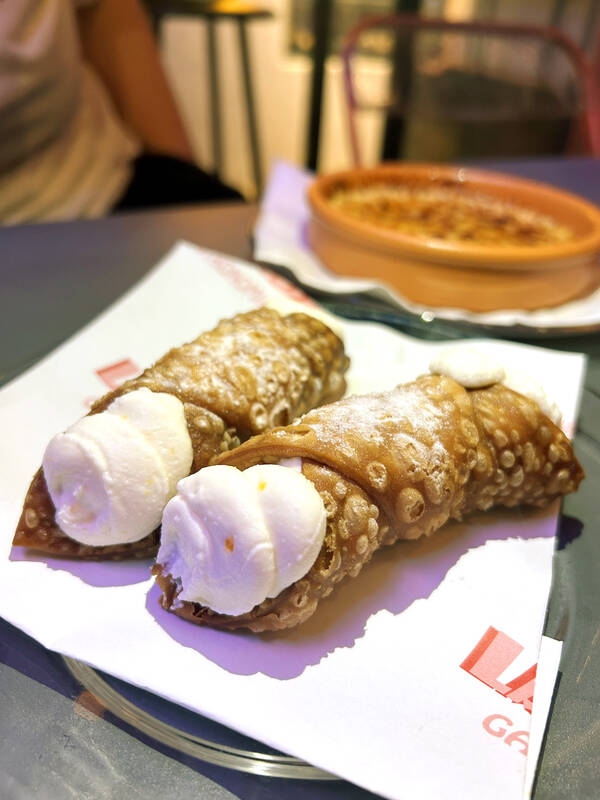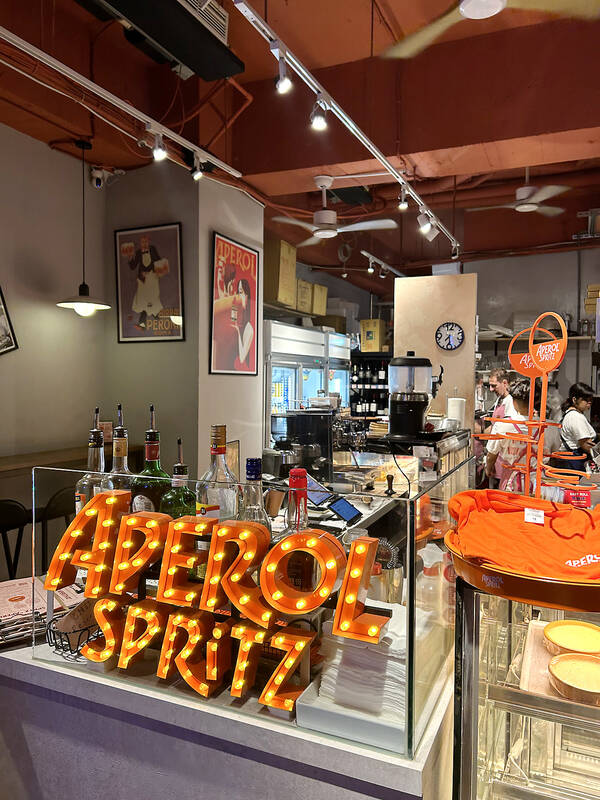There is perhaps no better way to soak up the last of Taipei’s balmy evenings than dining al fresco at La Piada with a sundowner Aperol Spritz and a luxuriant plate of charcuterie.
La Piada (義式薄餅) is the brainchild of Milano native William Di Nardo. Tucked into an unassuming apartment complex, fairy lights and wining diners lead the way to this charming slice of laid-back Mediterranean deli culture.
Taipei is entirely saturated with Italian cuisine, but La Piada offers something otherwise unseen on the island. Piadina Romagnola: a northern Italian street food classic. These handheld flatbreads are stuffed with cold cuts and tart cheeses aged like fine imported wine, also available here by the bottle.

Photo: Hollie Younger
The piada dough is a peasant recipe of humble beginnings; just flour, water, salt and pork fat. But if the bread is simple, the fillings at La Piada are anything but. Peppery rucola, delectably stringy proscuitto, tangy balsamic, salty shaved Parmesan — Italian flavor explosions of Mediterranean acid, moreish cold cuts and zingy fresh produce.
The first and only piada spot in Taiwan, Di Nardo moved his sandwich deli to this permanent Songshan District (松山) fixture in July 2022. With a culinary resume spanning from Italian kitchens to hotels in Shanghai and Jakarta, he now channels his expertise into this homely hidden gem, equal parts affordable and indulgent.
We step inside to the scent of freshly baked blue cheese onion quiches cooling on the counter and are greeted by the warm glow of La Piada and that world-famous Italian hospitality.

Photo: Hollie Younger
We begin as every diner here should: NT$640 will get you two aperitivo, sparkling Italian cocktails, and a generous plate of cold cuts: sliced beef, salami, provolone cheese and delicious locally-grown olives elevated with in-house chili garlic dressing.
We order one Aperol Spritz, a lighter, fruitier option, and one Campari Spritz, its darker, boozier cousin, both served bubbly with prosecco and soda.
Next up, we try the signature piada. We opt for the roast beef (NT$380), a textural delight packed with thinly sliced, medium-rare cold cuts, artichoke cream, arugula and Parmesan, splashed with a balsamic glaze. The dough is light and chewy, yet understated enough to leave the spotlight on the fresh fillings.

Photo: Hollie Younger
A must-order for the table is the mixed roasted veggie salad (NT$260); generous chunks of eggplant spliced with ribbons of carrot and zucchini on a bed of greens, topped, again, with slabs of Parmesan. This dish highlights local produce, with the acidic dressing cutting through the glutenous feast.
The menu also offers a piada and pizza hybrid creation: the piad-izza. We opt for the prosciutto and rucola (NT$380). We were grateful for the crispy and refreshingly light piada base, letting the toppings shine and leaving room for dessert, while even the tomato sauce highlights the care cooked into every element.
If that wasn’t quite enough carbs for one day, we follow the crowd and finish up with two house-made Sicilian cannoli (NT$150). Lightly fried cinnamon dough filled with lemony ricotta cream — it crackles with each bite. Our Catalana cream (NT$150), a shallower, lighter creme brulee still with that signature glassy top, delivers that perfect caramelized crunch.

Photo: Hollie Younger
La Piada also sells vegan and vegetarian options, plus an extensive homemade dessert selection. Di Nardo’s deli counter offers cheeses and meats for takeaway, frozen piada dough and lasagnas and a fantastic selection of imported wine and pastas.
This spot is lively even on a weeknight; our fellow diners have the same thought as us; girls’ night catch-ups with a bottle of red. Indoors invites bar-style seating and the patio offers small tables, covered and heated for year-round al fresco-ing.
And as we finish off our drinks aglow under the string lights, it’s easy to forget we’re in Taipei — La Piada brings a quiet slice of Italy to the city, inviting us to linger just a little longer.

Photo: Hollie Younger

In the March 9 edition of the Taipei Times a piece by Ninon Godefroy ran with the headine “The quiet, gentle rhythm of Taiwan.” It started with the line “Taiwan is a small, humble place. There is no Eiffel Tower, no pyramids — no singular attraction that draws the world’s attention.” I laughed out loud at that. This was out of no disrespect for the author or the piece, which made some interesting analogies and good points about how both Din Tai Fung’s and Taiwan Semiconductor Manufacturing Co’s (TSMC, 台積電) meticulous attention to detail and quality are not quite up to

April 21 to April 27 Hsieh Er’s (謝娥) political fortunes were rising fast after she got out of jail and joined the Chinese Nationalist Party (KMT) in December 1945. Not only did she hold key positions in various committees, she was elected the only woman on the Taipei City Council and headed to Nanjing in 1946 as the sole Taiwanese female representative to the National Constituent Assembly. With the support of first lady Soong May-ling (宋美齡), she started the Taipei Women’s Association and Taiwan Provincial Women’s Association, where she

Chinese Nationalist Party (KMT) Chairman Eric Chu (朱立倫) hatched a bold plan to charge forward and seize the initiative when he held a protest in front of the Taipei City Prosecutors’ Office. Though risky, because illegal, its success would help tackle at least six problems facing both himself and the KMT. What he did not see coming was Taipei Mayor Chiang Wan-an (將萬安) tripping him up out of the gate. In spite of Chu being the most consequential and successful KMT chairman since the early 2010s — arguably saving the party from financial ruin and restoring its electoral viability —

It is one of the more remarkable facts of Taiwan history that it was never occupied or claimed by any of the numerous kingdoms of southern China — Han or otherwise — that lay just across the water from it. None of their brilliant ministers ever discovered that Taiwan was a “core interest” of the state whose annexation was “inevitable.” As Paul Kua notes in an excellent monograph laying out how the Portuguese gave Taiwan the name “Formosa,” the first Europeans to express an interest in occupying Taiwan were the Spanish. Tonio Andrade in his seminal work, How Taiwan Became Chinese,